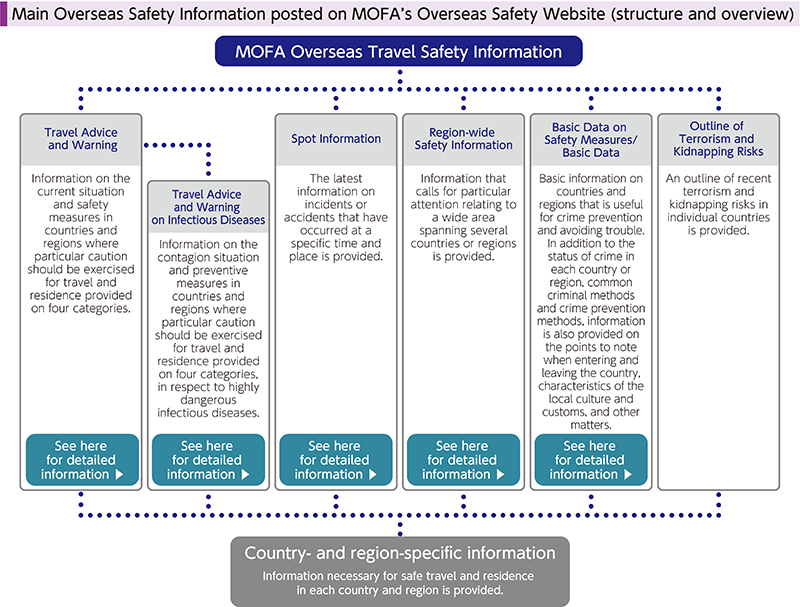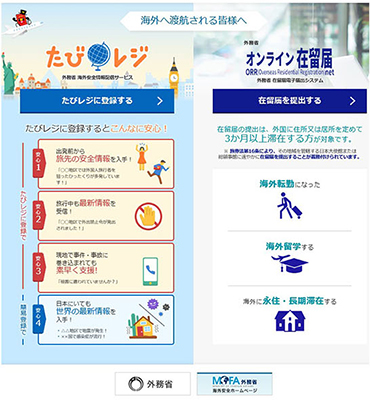Diplomatic Bluebook 2022
Chapter 4
Japan's Diplomacy Open to the Public
Section 2 Supporting Japanese Nationals Overseas
1 Risks and Safety of Japanese Nationals Overseas
(1) Incidents and Accidents in 2021 and Countermeasures
As of 2021, approximately 510,000 Japanese nationals1 travelled overseas over the course of the year, and approximately 1.34 million Japanese nationals live abroad (as of October 2021). Hence, protecting the lives and health of Japanese nationals traveling and residing abroad, as well as promoting their interests, is one of the most important missions of MOFA.
No Japanese nationals have been victims of terrorism incidents since 2020. However, 2021 was another year in which a large number of terrorist attacks occurred in various regions. The main terrorism incidents included serial suicide attacks in Baghdad, Iraq2 (January), attacks at massage parlors in Atlanta, the U.S. (March), an attack in Palma, Mozambique (March), a suicide attack in Makassar, Indonesia (March), an attack at a police station in a Paris suburb, France (April), a knife attack in Wurzburg, Germany (June), a suicide attack near the airport in Kabul, Afghanistan (August), an attack with a bow and arrow and other weapons in Kongsberg, Norway (October), a fatal knife attack against a House of Commons member in Leigh-On-Sea, the UK (October), a taxi explosion in Liverpool, the UK (November), and serial suicide attacks in Kampala, Uganda (November).
In recent years, terrorist attacks have been occurring not only in the Middle East and Africa but also in Europe, the U.S. and Asia where many Japanese nationals travel and reside. There continues to be a large number of homegrown terrorist attacks perpetrated by those born in Western countries and indoctrinated through websites or other means by foreign Islamic extremists, lone-wolf terrorist attacks perpetrated by those acting on their own with little organizational background, and terrorist attacks that are aimed at “soft targets” – locations where unspecified numbers of the general public gather every day. Especially in the U.S., alarms are being sounded over hate crimes motivated by hatred toward a particular race or ethnic group, as well as domestic terrorism perpetrated by extremists and others with anti-government ideology.
In 2021, the number of people traveling overseas did not increase significantly due to the ongoing impact of the novel coronavirus disease (COVID-19). While the number of incidents in which Japanese nationals fell victim to crimes declined compared to normal years, such incidents occurred worldwide.
Natural disasters also occurred around the world and caused great damage. These included floods due to heavy rainfall mainly in western Germany and southern Belgium in July and a volcanic eruption in the Canary Islands in Spain in September.
In 2021, in response to the worsening security situation in various parts of the world due to political instability and other factors, MOFA warned Japanese residents through Travel Advice and Warning, Spot Safety Information, and consular e-mails. Amidst the deteriorating situation in Israel and Palestine, MOFA raised the risk level for the Gaza Strip and its border areas to evacuate and avoid all travel in May, but following the subsequent cease-fire, lowered it to the original level of avoid all travel in July. For Sudan, due to the detention of senior government officials by the military and protests against the detention, MOFA issued Spot Safety Information and sent consular e-mails in September to advise against non-essential outings. For Ethiopia, where intense fighting broke out between government and rebel forces, MOFA raised the risk level to evacuate and avoid all travel for the entire country in November and strongly urged Japanese residents to evacuate from the country. Amidst heightened tensions with Russia since December, MOFA also raised the risk level for all of Ukraine to evacuate and avoid all travel, and has urged Japanese residents to return to Japan on commercial flights.
As was the case in 2020, there were continued reports of people falling ill during a trip abroad and dying at the hotels or other accommodations they were staying at. In some of these accidents and illnesses, victims faced difficulties in dealing with higher medical and transportation costs and receiving insufficient medical services compared to those in Japan, as well as differences in quarantine systems among countries.
Whenever necessary, MOFA issues overseas travel safety information on infectious diseases, air pollution and other risks in countries and regions where health and medical caution is required, in order to communicate the current outbreak situation and prevention measures, and highlight matters worth paying attention to when travelling and staying in the affected regions.
Since the end of 2019, new cases of COVID-19 infections decreased in some regions as the vaccination rollout progressed. Nevertheless, COVID-19 continued to spread across the world in 2021, following on from 2020, due to the emergence of mutant strains such as the highly infectious Delta and Omicron variants. In response, MOFA has been disseminating information such as Travel Advice and Warning on Infectious Diseases and Spot Safety Information to Japanese nationals residing or traveling abroad in order to raise their awareness in a timely and appropriate manner, via its website and e-mails (see the Opening Special Feature 2 on page 2).
As for other infectious diseases, cases of Ebola were reported in the Democratic Republic of the Congo and Guinea, and measles was prevalent in various parts of the world. In addition, cases of the Middle East Respiratory Syndrome (MERS) have been reported in the Middle East. Mosquito-borne diseases, including the Zika virus, yellow fever, dengue fever and malaria, also spread throughout the world.



- 1 Source: Ministry of Justice, “Statistics on Legal Migrants”
- 2 In addition to the incidents listed, several large-scale terrorist attacks occurred in 2021 in countries and regions for which Travel Advice and Warning levels 4 and 3 have been issued, such as Afghanistan, Iraq, Syria and Somalia.
(2) Safety Measures for Japanese Nationals Overseas
The number of Japanese nationals receiving support or protection from Japanese diplomatic missions overseas and the Japan-Taiwan Exchange Association fell in 2020 to a total of 14,771, given that the number of people traveling overseas did not significantly increase due to the impact of COVID-19. Nevertheless, the number of cases of support or protection increased to 21,762 as Japanese embassies, consulates-general and other diplomatic missions worldwide frequently assisted Japanese residents and travelers who had difficulty returning to Japan, and communicated COVID-19 information.
The safety of Japanese nationals is threatened constantly in various regions throughout the world. In particular, with the prolonged impact of COVID-19, Japanese nationals traveling abroad must be prepared for multiple risks such as terrorist attacks amid an infectious disease pandemic, continued restrictions on entry and movement imposed on the travelers of various countries and various constraints such as reduced flights. In addition, because it is becoming more difficult than ever before to respond in cases where such travelers are unfortunate enough to encounter a terrorist attack or other incident or accident while overseas, the need for every possible effort to be expended on overseas safety measures is increasing all the more.
Based on this perspective, MOFA works to enhance the safety awareness of Japanese nationals and promote its safety measures by disseminating information widely to the general public.
Specifically, MOFA added panels to its Overseas Safety website page for easy access to the necessary information, and issues the latest safety information for each country and region on the website. In addition, MOFA emails the latest safety information on travel destinations to Japanese residents and travelers who have registered with Overseas Residential Registrations, or Tabi-Regi, MOFA's overseas travel registration service.
MOFA strives to enhance the knowledge and capability of the Japanese people concerning overseas safety measures and crisis management through seminars and training. In 2021 MOFA held virtual seminars on safety measures inside and outside Japan to address the need for safety measures taking into account the prolonged impact of COVID-19. Furthermore, Consular Affairs Bureau staff delivered lectures in a virtual format at seminars held throughout Japan by domestic organizations, associations and other groups (12 times overseas and 11 times within Japan).
In addition, the public and private sectors are cooperating to advance safety measures even overseas, and the diplomatic missions in each country host regular meetings of Security Consultation and Liaison Committees. Even amidst the COVID-19 pandemic, the diplomatic missions overseas are continuing to share information, exchange opinions and bolster collaboration in preparation for emergencies with local Japanese nationals in their respective countries, including by hosting such events online.
Following the terrorist attack in Dhaka in July 2016, MOFA developed Golgo 13's Security Guidelines for Japanese SMEs Abroad, with the aim of raising the awareness of international cooperation personnel, as well as small- and medium-sized enterprises (SMEs), students studying abroad and short-term travelers, who have limited access to information on safety. MOFA continued to promote awareness by adding cases and commentary on addressing the combined risk of an infectious disease pandemic and terrorist attacks and other composite risks to the Security Guidelines.
Furthermore, with regard to Japanese students studying overseas, MOFA personnel hold lectures at universities and other educational institutions, on the grounds that many such institutions have not accumulated sufficient expertise or experience in safety measures and dealing with emergency situations, and requested their cooperation in raising the submission rate of Overseas Residential Registrations. Requests for lectures from educational institutions declined in 2021 due to the impact of COVID-19, but MOFA nevertheless continues to strive to help those institutions to raise awareness of safety measures among their students and build in-house crisis management structures, including by holding online lectures on safety measures. MOFA is moving ahead with efforts to connect government agencies with educational institutions, overseas study agencies and students studying abroad, by beginning an automatic Tabi-Regi registration system with some overseas study institutions.
As for safety measures for short-term travelers, MOFA is engaged in PR activities mainly focused on promoting registration to the above-mentioned Tabi-Regi, including by distributing information cards and the Kaigai Anzen Tora no Maki (handbook for overseas travelers).
As of November 2021, the number of travelers who had registered on Tabi-Regi since its launch in July 2014 exceeded 6.75 million, reflecting initiatives for enhancing the system's convenience and activities that aim at promoting registration.

